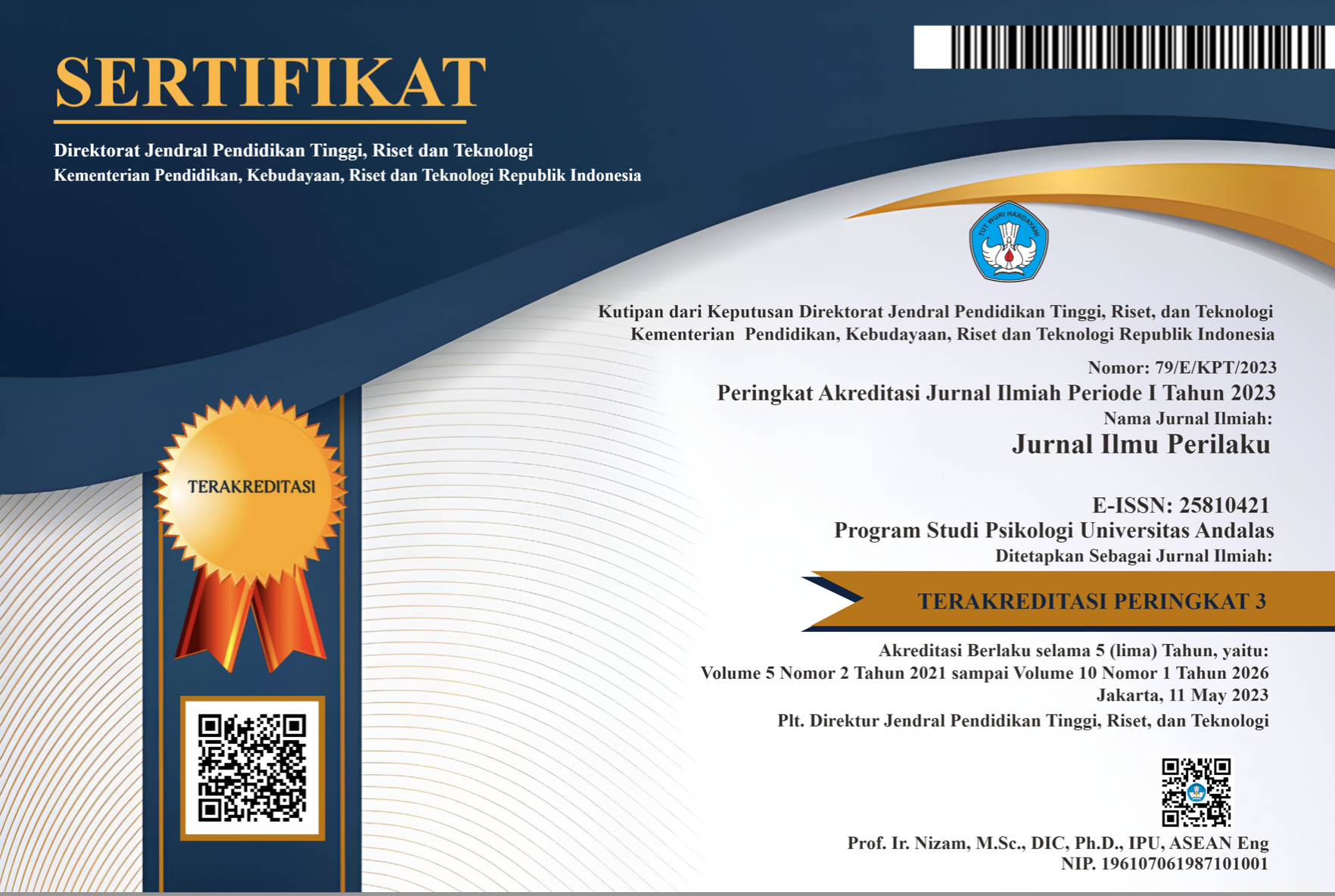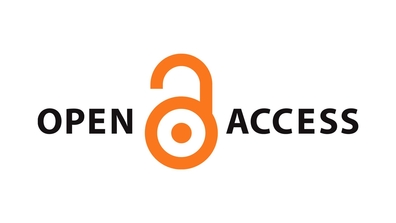Parenting Self Efficacy pada Orang Tua dengan Tuna Netra
Abstract
This research aims to explore significant description and factors that influence parenting self efficacy toward blind parents with middle childhood children. This research basically applies phenomenology qualitative method. The subject of this research focuses on two couples of blind parents who live with their middle childhood children. The data collection is conducted by applying the interview and observation. All responses were analysed with Van Kaam phenomenology method which has been modified by Moustakas (1994). Parenting self efficacy of the four informant shows great value on domain nurturance, however it shows less value on domains of discipline and recreation. There are various factors that affect parenting self efficacy on these subjects, such as limitation of eyesight, childhood experience, culture and community, experience with children, cognitive level, sociomarital support, and busy hours. Besides, number of children, economy, and children’ severe disease can also be influential factors of parenting self efficacy.
Downloads
References
Bandura, A. (1989). Regulation of cognitive processes through perceived self-efficacy. Developmental Psychology, 25 (5), 729—735.
Bowlby, J. (1980). Attachment and loss: Vol 3. Loss: Sadness and depression. London: Hogarth Press.
Brooks, J. (2011). The process of parenting (8th edition). New York: McGraw- Hill.
Campion, M.J. (2005). Who’s fit to be parent? United States: Routledge.
Coleman, P.K., & Karraker, K.H. (1997). Self-efficacy and parenting quality: Finding and future applications. Developmental Review, 18, 47—85.
Coleman, P.K., & Karraker, K. H. (2000.) Parenting self-efficacy among mothers of school-age children: Conseptualization, measurement and correlates. Family Relations: An Interdisciplinary Journal of Applied Family Studies, 49 (1), 13—24.
Coleman, P.K., & Karraker, K.H. (2005). Parenting self-efficacy, competence in parenting, and possible links to young hildren’s social and academic outcomes. Dalam Saracho, O.N., & Spodek, Bernard (Ed). Contemporery perspectives on families, communities, and schools for young children. United States: IAP.
Cram, P.H., Waarfield, M.E., Shonkoff, J.P., & Krauss, M.W. (2001). Children with disabilities: A longitudinal study of child development and parent well being.
Monographs of the society for research in child development, 66 (3).
Deshen, S. (2012). Blind people: The private and public life of sightless israelis. New York: SUNY Press.
Freedman-Doan, C.R., Arbreton, A.J., & Eccles, J.S. (1995). Under my Influence? Parent and family factors associated with parenting efficacy in the elementary years. Symposium: Models of parenting efficacy from infancy through adolescence.
Glover-Graf. (2012). Sexuality and disability. Dalam Marini, Iromo dkk (Ed). Psychosocial aspects of disability: Insider perspective and strategies for counselors. New York: Springer Publishing Company.
Hallahan, D,P., & Kauffman, J.M. (1988). Exceptional children: Introduction to special education (4th ed). New Jersey: Prentice Hall.
Holloway, S.D., & Behrens, K.Y. (2002). Parenting self efficacy among Japanese mpthers: Qualitaive and quantitative perspective on its association with childhood memories of family relations. New Diractions for Child and Adoloescent Development, 96, 27—43.
Hong, Y. R., & Park, J. S. (2012). Impact of attachment, temperament, and parenting on human development. Korean Journal of Pediatrics, 55(12), 449—454.
Hoover-Dempsey, K.V., & Sandler, H. M. (1997). Why do parents become involved in their children’s edication? Review of educational research, 67 (1), 3—42.
Hurlock, E.B. (1980). Psikologi perkembangan suatu pendekatan sepanjang rentang kehidupan. Jakarta: Erlangga.
Jones, T., & Printz, R. (2005). Potential roles of parental self-efficacy in parent and child adjusment: A Review. Clinical Psychology Review, 25 (3), 341—363.
Kef, S., & Hatzmann, J. (2011). Parenting of mothers and fathers with low vision. Amsterdam: VU University.
Leerkes, E. M., & Crockenberg, S. C. (2002). The development of maternal self-efficacy and its impact on maternal behavior. Infacy, 3(2), 227—247.
Meadow-Orlans, K.P. (2002). Parenting with a sensory or physical sisability. Dalam Bornstein, M.H(Ed). Handbook of parenting, 4. New Jersey: Lawrence Erlbaum.
Moleong, L.J. (2007). Metodologi penelitan kualitatif. Bandung: PT Remaja Rosdakarya Ofset.
Papalia, D., Olds, S., & Feldman, R. (2009). Human Development “Perkembangan Manusia” (Edisi 10). Jakarta: Salemba Humanika.
Prilleltensky, O. (2007). My child is not my carer: Mother with physical disabilities and the well-being of children. Dalam Marini, I., & Stebnic, M.A (Ed). The Psychological and Social Impact of Illness and Disability (6th edition). New York: Springer Publishing Company.
Putri, A.A. (2012). Bekerja dalam keterbatasan. Majalah Psikomedia: Media Bicara dan Perilaku (Edisi Tahun 2012).
Socha, T.J., & Staten, C. (2005). Parenting by touch, sound and scent I: Towards a positive eserch agenda. Parental Communication and Blindness.Boston: National Communication Association.
Suzuki, S., Holloway, S. D., Yamamoto, Y., & Mindnich, J. D. (2009). Parenting self-efficacy and social support in Japan and the United States. Journal of Family Issues, 30(11), 1505—1526.
Teti, D.M., & Gelfand, D.M. (1991). Behavioral competence among mothers of infant in the first years: The meditational role of maternal self efficacy. Child Development, 62 (5), 918—929.
Wiryasaputra, T.S. (2003). Mengapa berduka, kreatif mengelola perasaan duka. Yogyakarta: Kanisius.
The non-commercial use of the article is governed by the Creative Commons Attribution license as currently displayed on Creative Commons Attribution-NonCommercial-ShareAlike 4.0 International License.
JIP's spirit is to disseminate articles published are as free as possible. Under the Creative Commons license, JIP permits users to copy, distribute, display, and perform the work for non-commercial purposes only. Users will also need to attribute authors and JIP on distributing works in the journal.
Please find the rights and licenses in Jurnal Ilmu Perilaku (JIP).
- License
The non-commercial use of the article will be governed by the Creative Commons Attribution license as currently displayed on Creative Commons Attribution-NonCommercial-ShareAlike 4.0 International License.
- Author’s Warranties
The author warrants that the article is original, written by stated author(s), has not been published before, contains no unlawful statements, does not infringe the rights of others, is subject to copyright that is vested exclusively in the author and free of any third party rights, and that any necessary written permissions to quote from other sources have been obtained by the author(s).
- User Rights
JIP's spirit is to disseminate articles published are as free as possible. Under the Creative Commons license, JIP permits users to copy, distribute, display, and perform the work for non-commercial purposes only. Users will also need to attribute authors and JIP on distributing works in the journal.
- Rights of Authors
Authors retain the following rights:
- Copyright, and other proprietary rights relating to the article, such as patent rights,
- The right to use the substance of the article in future own works, including lectures and books,
- The right to reproduce the article for own purposes, provided the copies are not offered for sale,
- The right to self-archive the article.
- Co-Authorship
If the article was jointly prepared by other authors, the signatory of this form warrants that he/she has been authorized by all co-authors to sign this agreement on their behalf, and agrees to inform his/her co-authors of the terms of this agreement.
- Termination
This agreement can be terminated by the author or JIP upon two months’ notice where the other party has materially breached this agreement and failed to remedy such breach within a month of being given the terminating party’s notice requesting such breach to be remedied. No breach or violation of this agreement will cause this agreement or any license granted in it to terminate automatically or affect the definition of JIP.
- Royalties
This agreement entitles the author to no royalties or other fees. To such extent as legally permissible, the author waives his or her right to collect royalties relative to the article in respect of any use of the article by JIP or its sublicensee.
- Miscellaneous
JIP will publish the article (or have it published) in the journal if the article’s editorial process is successfully completed and JIP or its sublicensee has become obligated to have the article published. JIP may conform the article to a style of punctuation, spelling, capitalization, referencing and usage that it deems appropriate. The author acknowledges that the article may be published so that it will be publicly accessible and such access will be free of charge for the readers.










